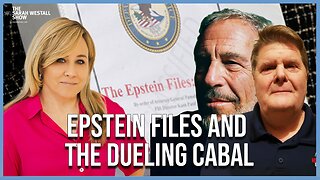Premium Only Content

Supreme Court lets Texas detain and jail migrants under SB4 immigration law as legal battle.
The Supreme Court on Tuesday cleared the way for Texas to immediately begin enforcing a controversial immigration law that allows state officials to arrest and detain people they suspect of entering the country illegally.
The court’s three liberals dissented.
Legal challenges to the law are ongoing at a federal appeals court, but the decision hands a significant – yet temporary – win to Texas, which has been battling the Biden administration over immigration policy.
The court had been blocking the law from taking effect, issuing an indefinite pause on the proceedings a day earlier, which was wiped away by Tuesday’s order.
Senate Bill 4, signed into law by Republican Gov. Greg Abbott in December, makes entering Texas illegally a state crime and allows state judges to order immigrants to be deported. Immigration enforcement, generally, is a function of the federal government.
The law immediately raised concerns among immigration advocates of increased racial profiling as well as detentions and attempted deportations by state authorities in Texas, where Latinos represent 40% of the population.
A federal judge in Austin had blocked the state government from implementing the law. But the 5th US Circuit Court of Appeals granted a temporary stay of the lower court’s decision and said the law would take effect on March 10 if the Supreme Court didn’t act. A pair of emergency appeals from the Biden administration and others soon followed.
Abbott on Tuesday called the court’s order a “positive development” but acknowledged the case will continue in the appeals court.
As is often the case in emergency applications, the Supreme Court did not explain its reasoning.
However, a concurring opinion written by Justice Amy Coney Barrett, joined by Justice Brett Kavanaugh, explained that the appeals court had handed down only a temporary “administrative” order. Barrett appeared eager to keep the Supreme Court out of reviewing such orders.
“So far as I know, this court has never reviewed the decision of a court of appeals to enter – or not enter – an administrative stay,” Barrett wrote. “I would not get into the business. When entered, an administrative stay is supposed to be a short-lived prelude to the main event: a ruling on the motion for a stay pending appeal.”
Barrett said she thought it was “unwise to invite emergency litigation in this court about whether a court of appeals abused its discretion at this preliminary step.”
Justice Sonia Sotomayor, whose dissent was joined by fellow liberal Justice Ketanji Brown Jackson, said the order “invites further chaos and crisis in immigration enforcement.”“So far as I know, this court has never reviewed the decision of a court of appeals to enter – or not enter – an administrative stay,” Barrett wrote. “I would not get into the business. When entered, an administrative stay is supposed to be a short-lived prelude to the main event: a ruling on the motion for a stay pending appeal.”
Barrett said she thought it was “unwise to invite emergency litigation in this court about whether a court of appeals abused its discretion at this preliminary step.”
Justice Sonia Sotomayor, whose dissent was joined by fellow liberal Justice Ketanji Brown Jackson, said the order “invites further chaos and crisis in immigration enforcement.”
-
 LIVE
LIVE
Dr Disrespect
8 hours ago🔴LIVE - DR DISRESPECT - PGA TOUR 2K25 LAUNCH DAY
3,628 watching -

Glenn Greenwald
2 hours agoGlenn Reacts to Trump-Zelensky Exchange and Takes Q&A from our Members | SYSTEM UPDATE #415
22.5K41 -
 LIVE
LIVE
Nerdrotic
4 hours ago $14.94 earnedMarvel PANIC MODE! Kathleen Kennedy GONE?! Hollywood DEI Dead | Friday Night Tights 342 Nick Freitas
8,870 watching -
 LIVE
LIVE
IsaacButterfield
4 hours agoFree Speech Is Dead | Did Trump Go Too Far? | Sexist Job
85 watching -

Sarah Westall
6 hours agoEpstein Files, Dueling Cabal Factions and Gold from Ancient Civilizations w/ Dave Hodges
9.93K3 -
 LIVE
LIVE
CatfishedOnline
5 hours ago23-Yr-Old Drove 2,650 Miles to Meet Online Girlfriend in Romance Scam
53 watching -
 LIVE
LIVE
Bare Knuckle Fighting Championship
2 days agoCountdown to BKFC FIGHT NIGHT ALBUQUERQUE & FREE LIVE FIGHTS!
117 watching -
 1:46:26
1:46:26
Vigilant News Network
6 hours agoDiddy’s Epstein Moment: Is the Fix Already In? | The Daily Dose
61K4 -
 1:57:50
1:57:50
Revenge of the Cis
5 hours agoEpisode 1454: Do You Feel In Charge
35.6K17 -
 1:05:17
1:05:17
In The Litter Box w/ Jewels & Catturd
23 hours agoEPSTEIN: PHASE ONE | In the Litter Box w/ Jewels & Catturd – Ep. 752 – 2/28/2025
94.5K49